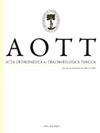骨皮质支架对温哥华B1型股骨假体周围骨折生物力学特征的影响
IF 1.1
4区 医学
Q3 ORTHOPEDICS
引用次数: 0
摘要
目的:探讨全骨腓骨移植物对温哥华B1型股骨假体周围骨折(PPFs)的生物力学影响。方法:在25例第四代合成股骨中建立温哥华B1型PFF模型,并使用双皮质、单皮质螺钉和电缆用锁定钢板固定。第1组不使用骨移植物,第2组将骨移植物置于前面,第3组将骨移植物置于中间。在第4组,皮质支撑异体移植物放置于股内侧皮质,锁定加压钢板(LCP)应用于股外侧皮质。在第5组,将异体支架移植物置于股骨前皮质上,采用与第4组相同的技术进行固定。然后对所有模型进行旋转和轴向循环刚度测试,并加载到失效状态,以测量和比较结构的机械强度。结果:在旋转力和轴向力作用下,4组内侧同种异体移植物循环加载前后的平均刚度值均高于其他各组。各组自体腓骨移植体(2、3组)的平均刚度值与前路同种异体移植体(5组)相似,但5组的平均初始轴向刚度高于2组。两组之间的故障负荷也没有差异。结论:虽然同种异体植入温哥华B1型股骨假体周围骨折的刚性最高,但如果使用单皮质和双皮质螺钉和电缆锁定钢板,自体腓骨移植也可以提供与同种异体移植相似的固定强度。本文章由计算机程序翻译,如有差异,请以英文原文为准。
The effect of onlay cortical fibula strut grafts on biomechanical features of Vancouver type B1 periprosthetic femoral fractures
Objective: This study aimed to investigate biomechanically the effects of onlay fibula grafts on Vancouver Type B1 Periprosthetic Femoral Fractures (PPFs). Methods: Vancouver Type B1 PFF models were created in 25 fourth-generation synthetic femurs and fixed with locking plates using bicortical, unicortical screws, and cables. While no graft was used in group 1, onlay fibula grafts were placed anteriorly in group 2 and medially in group 3. In group 4, the cortical strut allograft was placed on the medial femoral cortex, and a locking compression plate (LCP) was applied to the lateral femoral cortex. In group 5, the strut allograft was placed over the anterior cortex of the femur and fixed with the same technique as in group 4. All models were then subjected to rotational and axial cyclical stiffness tests and load to failure to measure and compare the mechanical strengths of the constructs. Results: The mean stiffness values of group 4 with medial allograft, before and after cyclical loading, were higher than all other groups, under both rotational and axial forces. The mean stiffness values of fibula autografts (groups 2 and 3) were similar to that of anterior allografts (group 5) in each test except that the mean initial axial stiffness of group 5 was higher than group 2. Failure loads were also not different between the groups. Conclusion: Although the rigidity of Vancouver type B1 periprosthetic femur fractures is highest if allografts are placed medially, fibula autografts can also provide similar fixation strengths to allografts if locking plates with unicortical and bicortical screws and cables are used.
求助全文
通过发布文献求助,成功后即可免费获取论文全文。
去求助
来源期刊

Acta orthopaedica et traumatologica turcica
ORTHOPEDICS-
CiteScore
2.00
自引率
0.00%
发文量
66
审稿时长
>12 weeks
期刊介绍:
Acta Orthopaedica et Traumatologica Turcica (AOTT) is an international, scientific, open access periodical published in accordance with independent, unbiased, and double-blinded peer-review principles. The journal is the official publication of the Turkish Association of Orthopaedics and Traumatology, and Turkish Society of Orthopaedics and Traumatology. It is published bimonthly in January, March, May, July, September, and November. The publication language of the journal is English.
The aim of the journal is to publish original studies of the highest scientific and clinical value in orthopedics, traumatology, and related disciplines. The scope of the journal includes but not limited to diagnostic, treatment, and prevention methods related to orthopedics and traumatology. Acta Orthopaedica et Traumatologica Turcica publishes clinical and basic research articles, case reports, personal clinical and technical notes, systematic reviews and meta-analyses and letters to the Editor. Proceedings of scientific meetings are also considered for publication.
The target audience of the journal includes healthcare professionals, physicians, and researchers who are interested or working in orthopedics and traumatology field, and related disciplines.
 求助内容:
求助内容: 应助结果提醒方式:
应助结果提醒方式:


